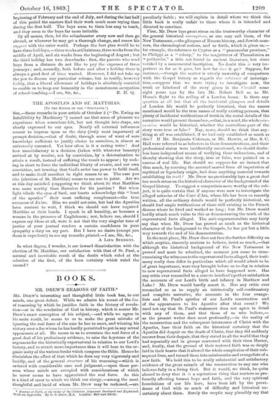THE APOSTLES AND ST. MATTHIAS.
[TO THE EDITOR OF THE SPECTATOR."]
SIR,—Some remarks in your article of October 2 (" Dr. Ewing on Infallibility by Machinery ") caused me that sense of pleasure we experience when sensations felt, but not thought into shape, are clearly expressed to our eyes. Nearly all external influences concur to impress upon us the duty (truly most important) of prompt decision,—that of doubt, through sense of want of sure knowledge sufficient to justify choice to ourselves, is almost as universally censured. Yet how often is it a saving voice ! Aud how unsatisfactory is a decision (taken with whatever honesty) arrived at by resolve, not by conviction, by a determination to attain a result, instead of suffering the result to appear ; by seek- ing in short to force the individual liberty of events, and our own conviction, not trusting that God's order has power to fulfil itself, and to make itself manifest in right season to us. The case you cite (election of St. Matthias) seems to me one in point. Are we at this day satisfied (supposing we think about it) that Matthias was more worthy than Barsabas for his position ? But when light blinds the eyes of Saul, our hearts acknowledge this " least of the apostles" their most sufficing complement—the true successor of Judas. Him we could not miss, but had the Apostles been content to wait, I think we should not have required Matthias at their hands. I speak in all humility, as becomes a woman in the presence of Englishmen ; nor, believe me, should I express my ideas at all, were it not that the very singular tone of justice of your journal renders a certain confidence in your sympathy a duty on my part. But I have no desire (except you deem it expedient) to see my remarks printed.—I am, Sir, &c.,
A LIFE STUDENT.
In what degree, I wonder, is our inward dissatisfaction with the election of St. Matthias, our satisfaction with that of St. Paul, a natural and inevitable result of the doubt which ruled at the selection of the first, of the keen certainty which ruled the second ?






























 Previous page
Previous page